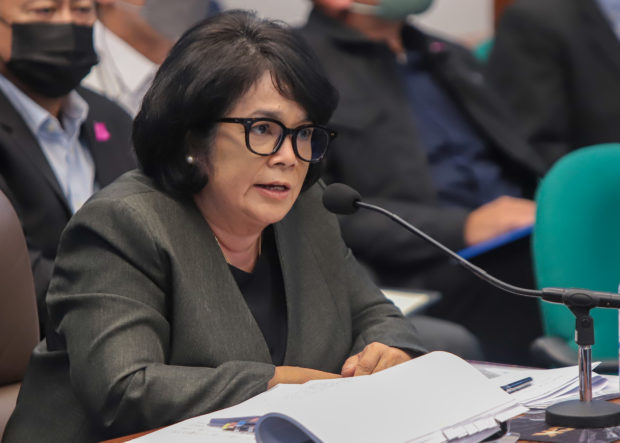
Environment Secretary Ma. Antonia Yulo-Loyzaga Senate PRIB file photo / Bibo Nueva España
MANILA, Philippines – The Philippine government’s repeated declaration of its intention to host the Loss and Damage Fund’s (LDF) board at the 28th Conference of the Parties to the United Nations Framework Convention on Climate Change (COP28) elicited mixed reactions from environmental advocacy groups in the country.
The government’s delegates at COP28, including Environment Secretary Maria Antonia Yulo-Loyzaga, have been batting for the Philippines to host the board of the LDF, saying that the country is a “living testament to the effects of climate change,” she said on Saturday.
For Kalikasan People’s Network for the Environment (Kalikasan PNE), the prospect of the Philippines hosting the board of a fund dedicated to aiding vulnerable nations in dealing with the impacts of climate change would be a positive development.
“The Philippines hosting the (loss and damage) fund is certainly a much better alternative than having the World Bank [WB] or similar institutions host it, and we welcome this statement from the Philippine government,” Kalisakan PNE National Coordinator Jon Bonifacio told Inquirer.net.
“Giving this (a seat at the LDF) to a climate-vulnerable country would present an opportunity for the interests of such countries to be prioritized,” Bonifacio added, maintaining that the Philippines continues to be the most “at-risk” country for natural disasters.
However, he stressed that hosting the LDF board involves “taking a stronger stance against the world’s top polluting countries” – a task which he said is yet to be accomplished by the current administration.
“Unless those things change or are resolved, it’s difficult to fully endorse this move,” he continued.
For fishers’ group Pambansang Lakas ng Kilusang Mamamalakaya ng Pilipinas (Pamalakaya), on the other hand, the Philippine government does not have any “moral ascendancy” to be one of the hosts of the LDF.
“The Marcos administration has been one of the major stumbling blocks as we confront the climate crisis,” Pamalakaya said in a text interview.
The fisherfolk group, in prior interviews and statements, have repeatedly condemned President Ferdinand “Bongbong” Marcos administrations’ flip-flopping on reclamation projects in Manila Bay.
In November, two reclamation projects in Pasay City were given the greenlight to resume development despite a standing order from Marcos himself in August to suspend all reclamation in Manila Bay.
READ: Resumption of 2 reclamation projects cheered, jeered
The LDF is set up to help vulnerable countries cope with the costly and damaging impact of climate disasters. It was launched on the first day of COP28 in Dubai on November 30.
READ: Pro-environment groups air concerns over climate damage fund
So far, the United Arab Emirates and Germany each committed $100 million to the LDF; the United Kingdom, $50.5 million; Japan, $10 million; the United States, $17.5 million; and the European Union $225 million, including Germany’s contribution.
READ: PH most disaster-prone country in the world—study
However, these pledges fall short of the UN’s estimated requirement of $387 billion annually for climate change adaptation measures in developing countries.